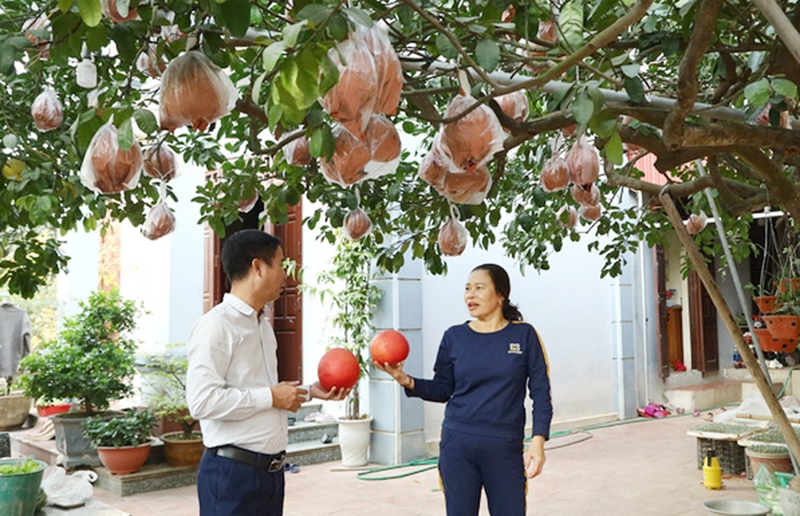 |
| Dong Cao Red Grapefruit (Me Linh District) needs to be preserved and expanded to enhance economic value and provide stable income for residents. (Photo: hanoimoi.vn) |
This initiative not only maintains and preserves Hanoi's specialty plants and animals, but also develops them into large-scale concentrated production areas.
Numerous specialty plants and animals offer high value
Nguyen Nhu Hao, Director of the Que Duong Safe Grapefruit Production Cooperative (Hoai Duc District), shared that the Que Duong grapefruit variety is popular due to its beautiful appearance, large size, thin peel and moderate sweetness. Que Duong grapefruit is a precious variety. After studying its genetic resources and growth characteristics, the Hanoi Agricultural Development Center (under the Hanoi Department of Agriculture and Rural Development) supported farmers in expanding this crop for commercial purposes. Additionally, the Hanoi Department of Agriculture and Rural Development also assisted residents in building the collective brand of Que Duong grapefruit, facilitating relatively smooth consumption. During the harvest season, traders purchase the grapefruits directly from the orchards at stable prices, yielding an income of around VND300-400 million per hectare per year, which is 2-3 times higher than rice cultivation.
Similarly, to preserve and effectively utilize the Van Dinh indigenous duck breed, Ung Hoa District and the Hanoi Livestock Breeding JSC proposed a project to the City People's Committee titled "Restoration, Exploitation and Development of the Van Dinh Indigenous Duck Breed on a Large Scale, Using Circular Ecological Agriculture, Experience Tourism, and Building a Closed-Loop Chain from Production to Consumption."
Nguyen Thi Thu Huong, Director of the Hanoi Livestock Breeding JSC, said that since 2015, the company has been breeding and restoring this duck breed. For production purposes, the company plans to develop a breeding flock of 10,000 Van Dinh ducks by 2025 and 20,000 by 2026. It is expected that by 2026, around 500,000 one-day-old Van Dinh ducklings will be provided to farms and households in Hanoi, and by 2027, this number will increase to around 1 million.
According to the Hanoi Department of Agriculture and Rural Development, the city currently has about 30 specialty plant and animal varieties, which have become famous brands and are included in the list of genetic resources that need to be preserved and developed. Expanding these rare plant and animal models has helped increase economic value for residents, contributed to environmental protection, and preserved and developed rare genetic resources.
Application of scientific and technical advances in production
Le Van Trang, Vice Chairman of the My Duc District People's Committee, stated that the district is focusing on planning agricultural experience tourism areas, developing the Huong Tich apricot variety, and introducing high-quality rice varieties into production in a safe and organic manner to increase the value of agricultural products.
Luong Van Phuong, Director of Dong Cao Red Grapefruit Cooperative (Me Linh District), shared that to preserve and expand the rare red grapefruit variety once offered to the king, the cooperative will coordinate with the agricultural sector to organize training classes for members on planting and caring for grapefruit, and post-harvest preservation, to develop the Dong Cao Red Grapefruit commercial production area. The cooperative is developing a project to process red grapefruit into grapefruit juice, grapefruit essential oil, and candied grapefruit peel, ensuring food safety requirements and aiming for export.
Nguyen Manh Phuong, Deputy Director of the Hanoi Department of Agriculture and Rural Development, affirmed that Hanoi's agricultural sector is closely coordinating with relevant departments and agencies, and institutes under the Ministry of Agriculture and Rural Development to preserve and store valuable genetic resources. They are gradually building production techniques for each type of plant and animal to improve productivity and reduce production costs. Additionally, developing specialty plants and animals with a focus on ecological and circular agriculture, and applying preservation and processing technologies, will elevate the capital's specialties.
Nguyen Lan Hung, General Secretary of the Vietnam Association of Biological Industries, suggested that to effectively preserve these resources, Hanoi should plan production areas for specialty plants and animals while strengthening the development of key local products. Relevant authorities need to have policies to encourage preservation and development efforts, focusing on financial investment and human resource training for this program.
Mr. Nguyen Lan Hung also noted that to sustainably develop indigenous plant and animal varieties, Hanoi's departments and sectors should evaluate and select rare genetic samples for research and breeding purposes. Through projects and restoration programs, they should support and encourage residents to expand their models, focus on transferring scientific and technical knowledge, and care for plants and animals. This will help build brands, develop local specialty product brands, promote consumption and increase economic efficiency for residents./.